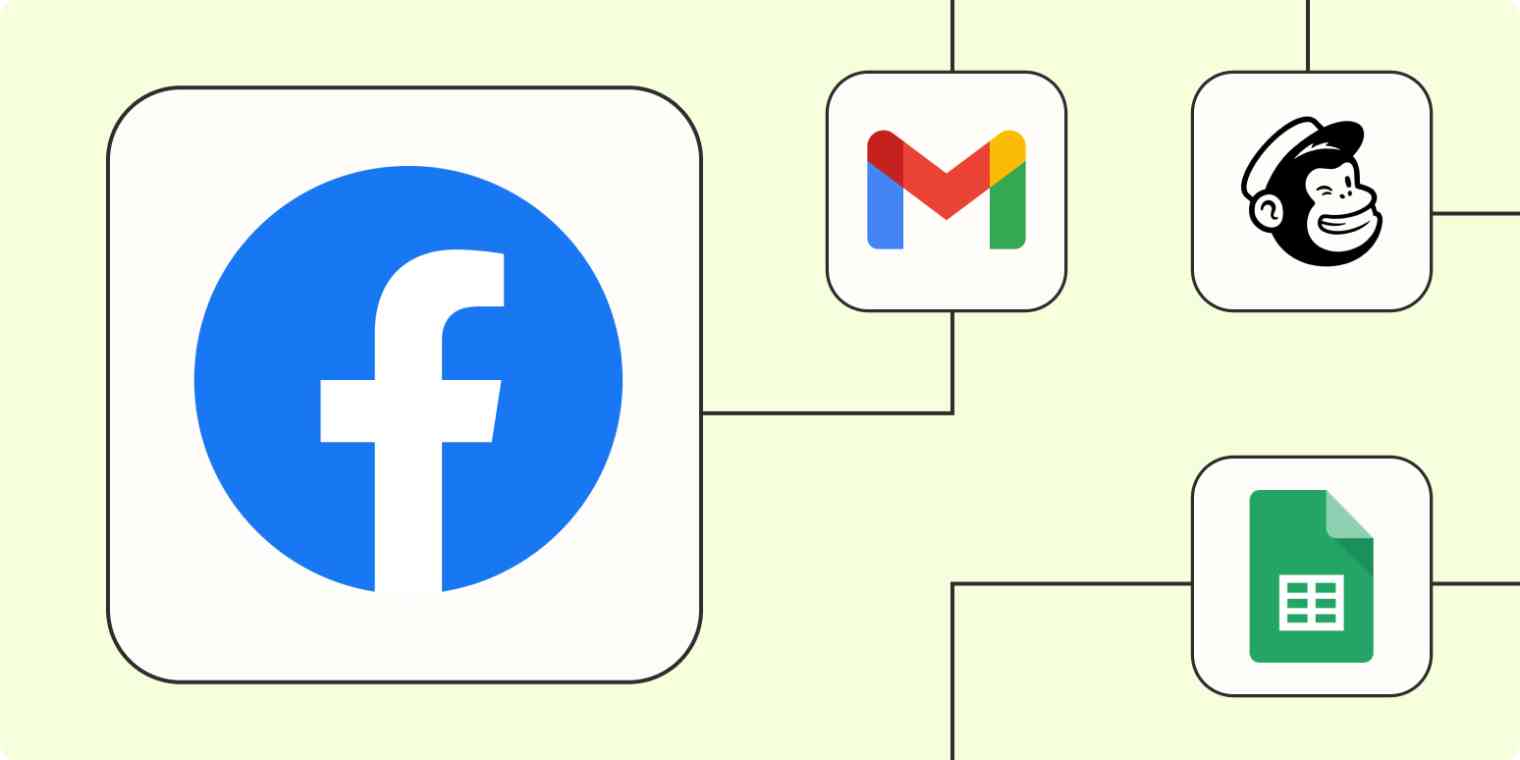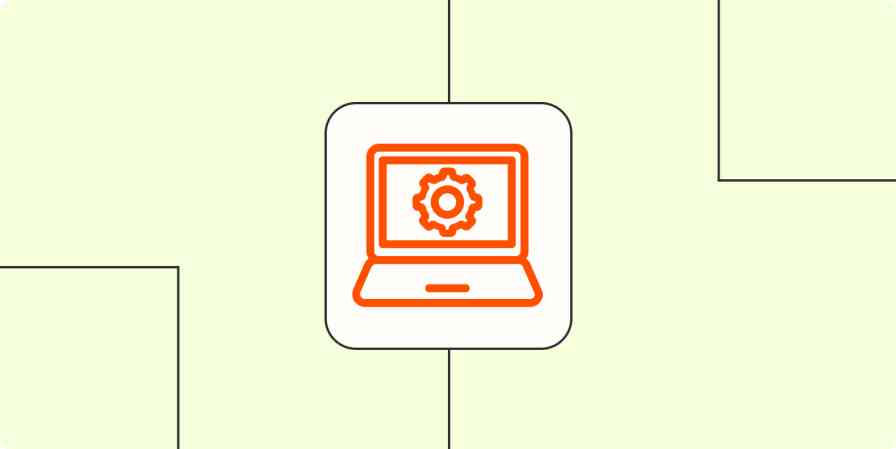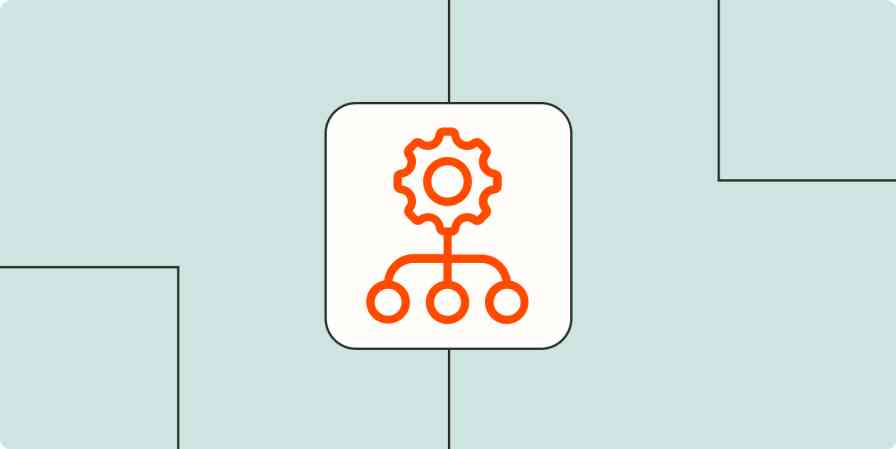You've captured some leads in Facebook Lead Ads, and now you need to act fast. Depending on where your prospects are in the sales funnel, you'll likely need your sales team to reach out while they're warm, send them nurture campaigns, or create custom deals in your CRM.
By automating this process every step of the way, you can avoid manually downloading leads and uploading them to the platforms you use the most.
Let Zapier's Facebook Lead Ads integration do it for you. Learn four ways to automate Facebook Lead Ads and increase your digital ad funnel's success.
Zapier is the leader in workflow automation—integrating with thousands of apps from partners like Google, Salesforce, and Microsoft. Use interfaces, data tables, and logic to build secure, automated systems for your business-critical workflows across your organization's technology stack. Learn more.
Skip ahead
To get started with a Zap template—what we call our pre-made workflows—just click on the button. It only takes a few minutes to set up. You can read more about setting up Zaps here.
Track leads in your CRM
The ability to automatically send lead information directly to the CRM (Customer Relationship Management) database of your choice with the right integrations is essential. This prevents you from needing to remember to check every few days to download new data, import it into your database manually, and then take action.
Instead, the data automatically syncs on a regular basis—potentially even in real-time—so your team will have a lead's information the second they complete that form.
This allows your sales team to register all new leads instantly so they can follow up as needed. They can track the lead through the sales process in your CRM, seeing when to send initial messages, when to follow up, and when to push to close.
Add new Facebook Lead Ads leads to rows on Google Sheets
Create contacts on Zoho CRM from new leads from Facebook Lead Ads
Create or update Keap Max Classic contacts from new Facebook Lead Ads leads
Add leads to campaigns on LeadConnector from new Facebook Lead Ads leads
They can even have new leads added to their project management software so nothing is ever missed.
Create items in monday.com from new leads in Facebook Lead Ads
Get customized alerts for new leads
It's not enough to simply have lead information show up in your CRM; you want your sales team to be notified right away, too.
This is crucial for businesses that have sales teams on hand for high-value products. This may include businesses in industries like car sales, marketing contracts, and services. You want to be able to get in touch right when users are at the peak of interest, and before they start looking for other solutions—automatic notifications for your sales team supports that work.
Send emails in Gmail for new leads in Facebook Lead Ads
Send emails from Gmail with summaries of new Facebook Lead Ad leads
Get Slack channel notifications for new Facebook Lead Ads
For National University of Health Sciences webmaster Rachel Campbell, it was a long process to get the university's Facebook leads into the hands of their Admissions team. Every week, Rachel would download leads, upload them to Hubspot, and then send them to the Admissions team, which uses a different CRM. Now, she lets Zapier handle all that.
"It literally saves me hours of work every week," she said. "In addition to ensuring we don't lose any leads due to manual error (of download/uploading sets of leads), it also saves me time. Our Admissions team is notified instantly, and our prospective students are contacted within 24 hours."
Nurture leads with automatic emails
Striking while the iron is hot is important, and while your sales team needs to know about new leads, having an automated email system do some of the heavy lifting can be a gamechanger, too.
As soon as leads convert off of your Facebook Ads, have an email autoresponder ready to go so it can send out a welcome series right away. If you offered a lead magnet (like an ebook, access to a webinar, or a coupon code for a free class), this kind of automated workflow promptly sends your leads exactly what they expect.
Subscribe new Facebook Lead Ad leads to a Mailchimp list
Add or update ActiveCampaign contacts with new Facebook Lead Ads leads
Add new Facebook Lead Ads leads to AWeber as subscribers
Ideally, you'll do the following when it comes to automatic emails:
Send the first autoresponder welcome email right away, as soon as the lead form is generated. Your new prospect might be excited about the lead magnet they converted on, so getting it to them ASAP is important.
Keep the first email simple. Don't start hitting them with a ton of aggressive offers right away. Welcome them, confirm their subscription, and let them know you're there if they have questions.
Send another email in a day or so with more information. This is why it's called a welcome series; your sales team can follow up a day or so later to assess where they're at and offer help, or you can offer additional content-focused newsletters. Test what works for your brand.
This leads to better user experience, too. If you're manually downloading leads from Facebook and manually inputting them into your CRM and a database or spreadsheet, people could be waiting hours—or days—to hear from you.
Siera Rejcek, an Account Executive at social media management company SocialStrategy1, used Zapier to streamline this process.
"We use Zapier to input any leads that we receive from Facebook ads into a Mailchimp list," she explained. "We have also connected our Mailchimp lists to our Google Sheets, so that when a lead is added to our Mailchimp list, they are then added to a lead spreadsheet. Because these Zaps are performed every 5 minutes, we know that as soon as an individual requests information, they are going to receive a welcome email and then be contacted by our customer service employees via our Google Sheet."
Generate custom deals and packages
When your sales team has the ability to create custom deals and packages for leads, you can expect to see your conversion rates increase accordingly. Even if they only seem custom or exclusive, that can help, too.
You can create deals or packages that are trackable as soon as new leads are generated from Facebook Lead Ads so you can track what's driving conversions. These can be generated automatically upon lead form completion, giving your sales team plenty of leverage to start off strong.
Create new leads and opportunities in Salesforce from Facebook Lead Ads
Create Pipedrive deals from new Facebook Lead Ads leads
Add new Facebook Lead Ads leads to HubSpot as deals
Use webhooks to fill in the gaps
Sometimes, you may come across a scenario where an app doesn't integrate with Zapier, or you need to customize (or format) the data differently to what you can achieve with Zapier's standard integrations.
When that happens, you can use Webhooks to fill in the gaps. These Zaps make sure that every time you receive a new lead via Facebook, they'll be automatically sent to the webhook URL you define—and formatted how you like.
Send custom request webhooks from new Facebook Lead Ads leads
Optimize your lead ads for your digital sales funnel
In many cases, using Facebook Lead Ads mid-funnel is the best approach.
If the first contact that a user has with your brand is a lead ad, they're more likely to fill out a form after they've watched a video ad showing a demo of your product or an ad sharing a customer testimonial, for example.
Retargeting can be incredibly valuable here, especially as you set up a Facebook funnel. You can create custom audiences who watched that first video to completion or from your customer list. You can also use the Facebook Conversions API to target users who visited your desktop site, allowing you to reach warmer audiences right off the bat.
With automation, you not only get leads faster, but receive more lead information because you have a more well-rounded and well-built digital sales funnel.
Related reading:
This article was originally published in February 2017, with previous contributions from Emily Irish and Ana Gotter. It was most recently updated in March 2024 by Elena Alston.





